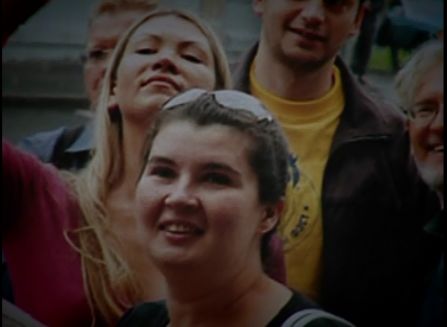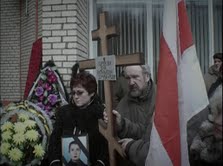33 year old Yana tragically took her own life almost a year ago, on 6 March 2009. Educated as a lawyer Yana Paliakova was an activist of the unregistered Legal Public Assistance organisation. She was also cooperating with other HR organisations, and was a member of the Volha Kazulina initiative group during the parliamentary election in 2008.
 Last March the Salihorsk district court found Paliakova (on photo) guilty of slander, Article 400.2 of the Criminal Court. She was charged with defaming a police officer and was sentenced to two years of a personal freedom restriction. Moreover, she had to pay a fine, as a moral compensation to the policeman.
Last March the Salihorsk district court found Paliakova (on photo) guilty of slander, Article 400.2 of the Criminal Court. She was charged with defaming a police officer and was sentenced to two years of a personal freedom restriction. Moreover, she had to pay a fine, as a moral compensation to the policeman.
She pleaded not guilty and claimed that the police officer had beaten her.
On the eve of Yana’s death, the biggest official newspaper Sovietskaja Biełorussija ran a satirical article featuring Belarusian human rights defenders including Yana Paliakova. According to her friends this publication was the last straw that pushed Yana towards her end.
The documentary author Volha Mikalaichyk showed this complex story through emotions and narratives of Yana’s friends and family. Elaborating on young woman’s horrible suicide Murder at the Dawn of Spring protagonists put a special stress on a ‘criminal’ character of the Belarusian regime. And the death of a human rights defender was an evidence of it.
Addressing the audience of journalists, embassy workers, and the Belarusian minority in Vilnius representatives the author confessed that Yana’s life had touched her profoundly and she could not simply be silent about it. As the result she produced a 25 minute emotional and touching film. It had been already premiered in Yana’s native city, Salihorsk (Central Belarus). According to Volha Mikalaichyk the documentary had resonated with the community. Yana’s relatives and her mere acquaintances would remember for a long time this year old tragedy.
The film will be shown at the Kyiv documentary festival in Ukraine. The author plans to send it to other similar events. Volha Mikalaichyk believes that cinema is a non-political method of civic activism, which she wants continue in the future.





